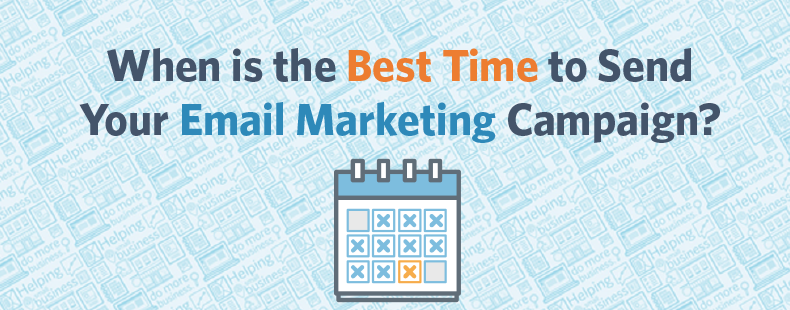When is the Best Time to Send Your Email Marketing Campaign?

Drumroll please.
The best time to send your email is…
There’s nothing we’d love more than to tell you a magic time and day that would give you the absolute best results for your email campaign.
But while we can’t give you exactly that, we do have more than enough data and proven best practices to offer you something more satisfying than the generic ‘it depends’ answer.
Use these 5 steps to find the best send time and day for your business:
1. Look at the trends
Industry trends are a great starting point when you’re first thinking about the best time to send your email. At Constant Contact, we regularly analyze customer email results to collect industry-specific data to help you know where you stand.In addition to updating you on the average open, click-through, and bounce rate each month, we also have this helpful chart that identifies prime times to send an email based on general trends by industry.
Based on the data, a clear trend across many industries is the highest open rates often occur early in the week. Monday morning is the optimal time for many different industries — which makes sense as many of your subscribers will approach the beginning of a week refreshed and engaged after the weekend.
Tip: Try sending out your next email newsletter early Monday morning before your subscribers’ weeks fill up with plans and commitments.
2. Think about your audience
Taking another look at the data, it’s interesting to see which industries perform better later in the week. Hotels, Inns, and B&B’s, for example, show best results Wednesday mornings, which might be a result of subscribers making plans for weekend getaways mid-week.(Learn more hospitality marketing best practices here.)
Additionally, religious organizations receive best results mid-day on Thursdays, a time that is likely closer to an upcoming service.
When thinking about the best day or time to send an email, focus on your audience. What do you know about their routines? When does your message have the best chance of reaching them when they have a moment to spare?
Remember that a growing number of people are checking emails on their mobile device. People don’t need to be sitting at home or at work in front of a computer to check their emails. This means you’ll need to think differently about how you reach your audience with your email campaigns.
Tip: You don’t have to rely on speculation alone. There’s a good chance you already have plenty of data about what works best for your audience within your email reports. While many factors influence email open rates, be sure to look for patterns that point to optimal times / days.
3. Think about your campaign
In addition to thinking about your audience, think about the timing around what you’re sending them. Because most of your contacts will be visiting their inbox every day, timely messages will often get you the best results.If your restaurant is running a special on appetizers on Thursday, you can experiment with sending emails out the day before, or even send last-minute reminders on the day of the special. Some of your subscribers will jump at the opportunity, and those who miss out might be more likely to join you the next time they get a chance.
Tip: Show that your message is well-timed within your subject line. If you have an event coming up, add the date in the subject line to create a sense of urgency.
4. Set expectations
For many businesses, one of the most important aspects of timing will be to choose a time and stick with it. Ideally, you want your contacts to expect to hear from you and be on the lookout for your next message.Maria Sadler of Looking Stylish, has seen great results from this kind of consistency. She sends her Friday Bulletin each week to contacts that have come to look forward to hearing from her.
Tip: Make it clear when your contacts can expect to hear from you right when they sign up. Add a short description of your newsletter to all your sign up forms, and be sure to mention when you’ll be sending out your messages. Then just be sure to follow through and keep your promise!

5. Test
Testing is especially useful if you’re working with a large email list. Start by segmenting your list into 2 or 3 smaller groups and experiment with sending the same message out at different times.Your test could be by time of day, like morning, afternoon or evening. Or you could try early in the week, mid-week, and weekend.
Keep everything else consistent so that the timing is the only thing that’s unique. Compare the open rates of each mailing and you can get a clear picture of what’s working the best.
Tip: Try this with a couple different mailings. It will be a bit more of a time commitment, but you can easily schedule in advance so you don’t have to worry about pressing send each time.
Comments
Post a Comment